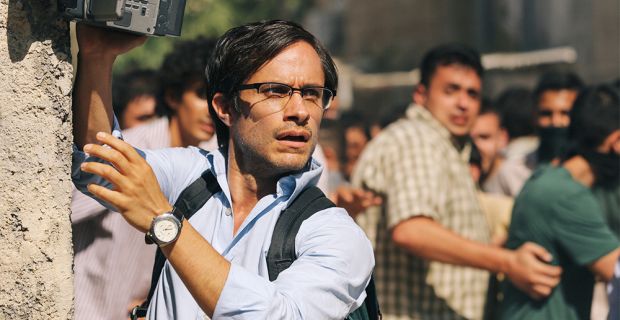
Film: Rosewater
Starring: Gael García Bernal
Directed By: Jon Stewart
Reporters in volatile countries like Iran spend their days bringing you the most objective form of the news whilst risking the lives of themselves and their families. In Rosewater, Jon Stewart’s writing and directing narrative feature debut, he tries to make that exact case resonate with an audience with varying degrees of success. Splicing actual news footage and archival footage from the riots that broke out in 2009’s Iranian elections, Stewart immerses himself in the culture that he is studying, something that is unbeknownst to plenty of directors today. Sadly, his loose grip on tone, themes, and messages gets away from him.
Maziar Bahari, played by Gael García Bernal (Amores Perros, The Science Of Sleep), is a journalist covering the 2009 Iranian elections. Always playing on the safe side with the video footage he takes, Bahari finds himself at a crossroads when he witnesses some terrible acts done by the military towards the citizens. With a pregnant wife, Paola (Vampire Academy‘s Claire Foy), and worried mother Moloojoon (Grimm‘s Shohreh Aghdashloo) in tow, Bahari decides to do what he thinks is right by videotaping and releasing some of the horrifying footage. Waking up the next morning, the Iranian government takes him, imprisons him for 118 days in Evin prison, interrogates him, and tries to force him to confess to being an American spy. This is the story about his time imprisoned and the world’s reaction to it.
Stewart may not be new to the production of a TV show but with Rosewater, he tries to spread his wings while keeping his political views intact. This is where the film succeeds. He structures Rosewater like it’s a journalistic exposé, one that remains objective, delivers the facts with no bias, and lets the viewer make their own decision about the events occurring. The story of Maziar’s time in prison and the social media movement that is caused because of that time is a harrowing tale. It lends to a more cinematic lens than Stewart is used to but keeping it lean on time and any narrative fat, Rosewater forms itself into a unique movie-going experience.
There’s no way to get around torture during imprisonment. It’s a brutal and sadistic act that can lead to no desirable outcome. Zero Dark Thirty is one of the latest defenders of using “torture porn” in their film for shock with an underlying message. In Rosewater, we don’t see Bahari get hit over and over. The interrogator tries to raise information out of him in other ways, accusing him of seditious acts and threatening his family. Once you get a taste of what the climate is like inside Evin prison for Bahari, you realize that this isn’t a movie made to look at the horrifying side of authority and humanity, it’s a film about how human will is unbreakable. How human will can be tempered, beaten down, forced to do things, but it always remains.
To me, where Rosewater thrives is when it makes a case for the risks that journalists take to deliver the news to people. There’s a really good film to be made about that exact plight but Rosewater isn’t it. Bernal portrays Bahari greatly as a man who changes radically over a short amount of time, a man that sees true horrors being done to normal people and feels like it’s his obligation to tell the world about those horrors. This kind of journalistic catch 22 he is put in causes him to get thrown in jail and then the film almost shifts directly into an overlying message about resilience. Although this may seem as a minor gripe, there are fleeting glimpses of greatness in Rosewater that come in the form of tales untold about the people who deliver us news about world events.
Stewart’s visual eye is still developing and with that, a few sequences in Rosewater cause some pause. In one scene, the surface of Iran is presented to be a mosaic of hashtags. Naturally, this was to present how the 2009 Iranian election riots were a social movement conducted through social media like Twitter and Facebook, much like Ferguson, Missouri. If Rosewater were to come out two years ago, this probably wouldn’t come off as gimmicky as it does. But, with films like Chef utilizing the flying Twitter bird as a visual aesthetic, Stewart fails to bring anything new to the table with that tactic. That isn’t to discount his intent though; he gets his point across with that one simple scene.
Through suicidal thoughts, fear, and lack of perseverance, Bahari’s struggle has to get creative to defy normalcy. The time we spend with the main character in his cell is enlightening as the film makes the argument that you don’t need shock for resonation in the viewer’s eyes. Sure, that case is made and backed up pretty well but to call back to the same gripe about journalistic plight, Rosewater doesn’t put this facet front and center, causing it to get lost under other anecdotes.
As a first feature, Stewart proves that he has amazing stories to tell and a somewhat cohesive format to tell them in. If anything, Rosewater may underwhelm but it’s a testament to the human soul during such trying times that we rarely see with this kind of real-life material.
GRADE: C+
Review written by Sam Cohen
Check out our interview with Maziar Bahari here!
https://www.youtube.com/watch?v=1jpAVB1JuMc
- MOVIE REVIEW: ‘Popstar’ has at least a few hits - June 3, 2016
- MOVIE REVIEW: ‘Neighbors 2: Sorority Rising’ is the rare sequel that tries - May 21, 2016
- MOVIE REVIEW: ‘The Nice Guys’ is a loopy, drunk masterpiece - May 20, 2016
